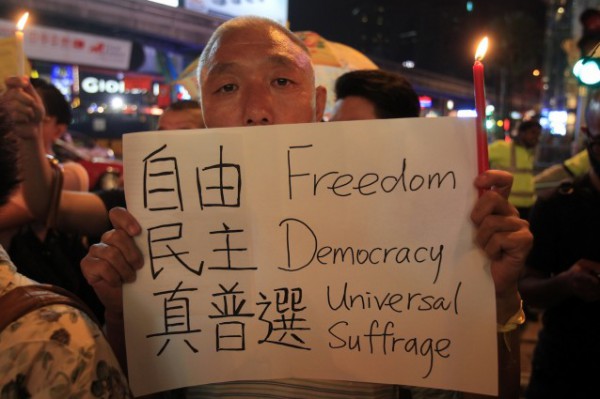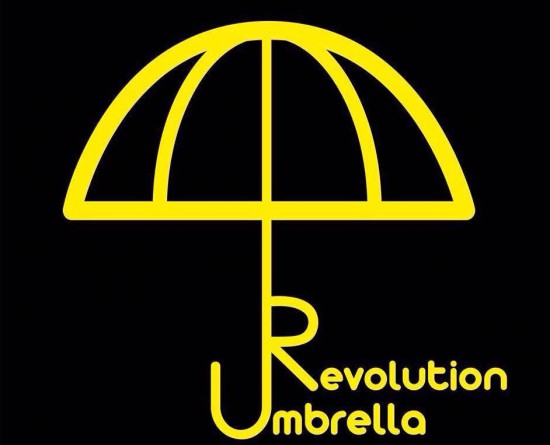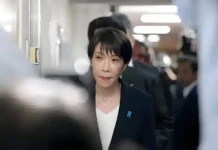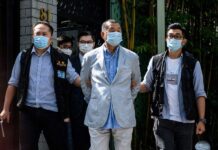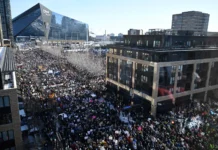A fighting democratic movement must be created to continue and build upon this historic “first round”
Editorial from Socialist magazine《社會主義者》issue 30 (Jan-Feb 2015)
After almost three months that transformed the outlook of hundreds of thousands if not millions in Hong Kong, the ‘Umbrella Revolution’ withdrew from the streets. The movement demanding free elections, as opposed to a rigged Iran-style election model as laid down by Beijing, had reached its limits and in the face of concerted government pressure found itself without a clear strategy to continue.
Having begun as a largely spontaneous mass movement, triggered by an orgy of police brutality, the protests not only shook the government to its core but also went far beyond the plans of the bourgeois pan-democratic leaders who make up the territory’s parliamentary opposition. The plan of Benny Tai Yiu-ting and his ‘Occupy Central’ (OC) team – a campaign group set up by allies of the pan-democrats – was to pack up after a mere three days and go home. One of the great achievements of the Umbrella Movement was that these ‘leaders’ were largely sidelined and discredited.
But spontaneity, lacking organisation and a strategy, while enough to save the movement from an early death at the hands of the police and ‘OC’ leaders, proved insufficient to carry the movement beyond the first few weeks. Progressively, with only occupation as its perspective, the movement ran out of energy and ideas. Occupying is an excellent start, but needs to upgrade to more effective means of mass struggle such as strike action. To mobilise new forces, counter media attacks and propaganda, and outmanoeuvre the representatives of a powerful state, organisation is needed – through democratic action committees. Above all, genuine democratic debate on tactics and demands is needed at every new turn.
In the aftermath of this historic struggle there is inevitably a mixed mood of frustration and disappointment on one side, tempered by defiance and a determination to fight on. Socialist《社會主義者》magazine, as our contribution to the post-Umbrella discussions, wishes to stress the achievements of this movement, but also to address the problems and political weaknesses that allowed the government to emerge without making significant concessions.
This ‘triumph’ will be scant compensation for CY Leung and Hong Kong’s ruling elite, which cannot look forward to any ‘return to normality’. Hong Kong changed irrevocably on September 28. As The New York Times notes, “The protests have also left the territory deeply polarised and trickier to govern.” The government’s hand can be further weakened by a new round of global economic crisis from which the Chinese and Hong Kong economies are unlikely to escape.
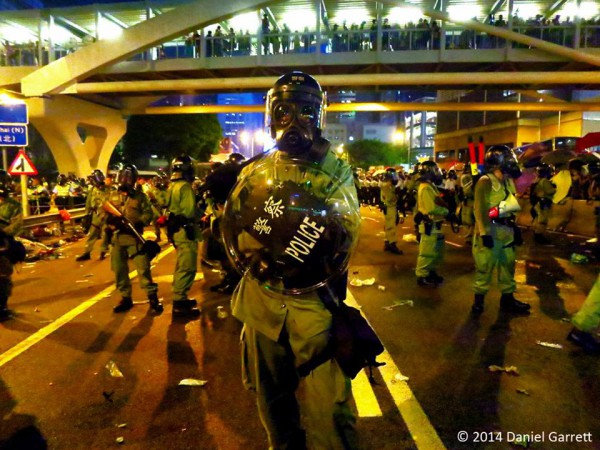
Umbrellas banned
So while the ‘Umbrella Movement’ may have been defused, the outcome is a pyrrhic victory that leaves the government weaker and more distrusted than ever. Public attitudes towards the police will never be the same again, and the same is true of the tycoons, who have been Beijing’s strongest allies. Their system – capitalism – offers nothing but growing poverty, dead-end jobs and in Hong Kong’s case the most expensive housing in the world. The humble umbrella – the symbol of the struggle – now strikes fear into the hearts of the ruling elite. When Xi Jinping arrived in Macau in December, using this visit to deliver several veiled warnings to Hong Kong’s democracy campaigners, news reporters were banned from holding umbrellas against the drizzle, and were issued with raincoats instead!
This small incident reveals a much bigger problem for the Chinese dictatorship (CCP) after a year in which its “periphery” erupted in unprecedented mass protests in Taiwan, Hong Kong and even in Macau itself. Taiwan’s President Ma Ying-jeou also rode out the mass ‘Sunflower Movement’ of March 2014 and gave away very little in the form of concessions, only to suffer the consequences in November’s electoral rout which signalled mass rejection of his CCP-friendly policies. All these developments are warning signs of the coming revolutionary tremors in China itself, where similar problems – lack of democracy, precarious jobs, widening inequality – affect the masses and especially the youth. A political regime that fears the sight of umbrellas at an official reception is much shakier than it wants us to think!
Hardening positions
In Hong Kong, new fault lines are likely to open in the coming period. The government may try to take an even harder line and single out certain protest groups for persecution. The police have a list of more than 200 people who may face serious charges connected with the protests, such as assault or resisting officers. A whiff of ‘white terror’ may be in the air. But this could backfire and trigger new protests. An attempt to revive the anti-subversion law Article 23 cannot be ruled out. This was demanded in a recent speech by Chen Zuoer, a top CCP advisor, known for his threats of ‘bloodshed’ in Hong Kong.
Many now believe the next round of political reform ‘consultations’, commencing 7 January, will see almost no concessions offered to the pan-democrats. The current 1200-strong Election Committee could be repackaged with few or no changes as the Nomination Committee (which under new rules for widening the electoral franchise in 2017 will weed out candidates opposed by the CCP). It may be that Beijing and the Hong Kong government now prefer the final reform package to be vetoed in the Legco (with one-third of the seats the pan-democratic parties can exercise a veto) meaning the status quo will be maintained. This could suit Beijing because they fear a mass campaign for ‘blank votes’ in 2017 that could shatter any remaining legitimacy for the bogus election system and see the next Chief Executive’s term start with a public humiliation. Again, the warning signs from Taiwan’s electoral earthquake will have been duly noted.
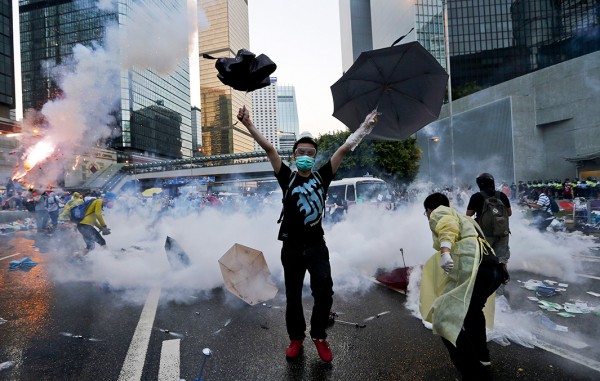
“Dam will burst”
Why did the Umbrella Movement not win at least some concessions from the government? This is due to its internal contradictions – a programme and leadership limited to seeking compromise and ‘reform’. The limits of this programme were on the one hand its search for a mythical form of coexistence with dictatorial rule in China, and on the other hand its lack of any vision to challenge capitalism, which has become a roadblock against social as well as democratic development. The CWI in China and Hong Kong has stressed throughout the Umbrella Movement that the democratic struggle can only succeed as a struggle for socialism.
A mass movement can force reforms out of an unwilling regime, as happened in Hong Kong in 2003 (Article 23) and in Macau earlier this year (against top politicians’ pensions and privileges). Beijing could reluctantly agree these concessions because they did not threaten its rule. But this is not the case with the current Hong Kong struggle. “We move back one step and the dam will burst,” a CCP official told The Standard (15 October). To accede to the protesters’ demand to withdraw the National People’s Congress (NPC) ruling, he said, could have “a domino effect with Tibet, Xinjiang and other parts of the mainland demanding the right to elections.”
This confirms what Socialist magazine has always said, that the struggle for democracy in Hong Kong must actively build support inside China, primarily from the working class, against dictatorial rule and against capitalist exploitation. Unfortunately, at this stage only a minority even among the protesters have grasped this fact. “Many Hong Kong students’ concerns are locally cocooned,” noted a report in Time magazine (10 October). The magazine quoted a young protester, “I am not interested in changing Chinese politics.” Yet overthrowing the repressive system in China is the only way to succeed.
A question of leadership
These political shortcomings, bordering on naivety, reflect the still powerful influence of the compromise pan-democrats and their echoes such as Benny Tai Yiu-ting. This is despite their loss of public support over many years, especially since the NPC’s August ruling (refusing even small democratic concessions) threw them into a state of paralysis. This meant they could not take the formal leadership of a movement they had struggled to postpone and prevent. Instead they were forced to hide behind the students who enjoyed greater trust among the masses.
“There were many times I felt I did not fit in,” Benny Tai Yiu-ting told the South China Morning Post, confessing he did not enjoy the occupation. In the early days, mass anger and spontaneous turnouts of up to 200,000 pushed these leaders much further than they wanted to go. The student leaders echoed the demand for CY to resign, although this demand later disappeared without explanation. “We are not seeking revolution. We just want democracy,” declared Joshua Wong Chi-fung of Scholarism in Admiralty on October 4. This was a theme of the student leaders’ speeches and the open letter they wrote to Xi Jinping on 11 October.
Without a coherent fighting strategy, whether tactical (to look beyond the occupations towards strikes and other broad forms of collective action), or political (to show that democracy in Hong Kong requires an end to dictatorial rule in China), this leadership was torn between those layers closer to the pressure from below, like the students, and those that reflected the pan-democratic leaders’ desperate search for a way out of the occupations.
In a Cable TV interview on December 22, after the movement had subsided, Tai revealed the existence of a backroom agreement to accept the government negotiator Carrie Lam Cheng Yuet-ngor’s offer of a supplementary report to Beijing as a “turning point” for calling off the occupations. Tai expressed his disappointment that the student leaders, who came under massive pressure from the protesters to oppose a retreat, didn’t accept this. This was immediately after the televised talks between Lam’s government team and student representatives on October 21. The ‘OC’ leaders, initially supported by the Federation of Students, pushed for an online referendum inside the occupied areas that included a question on the government report. Socialist Action campaigned vigorously against this referendum saying it was a misuse of ‘democracy’ within the movement and a manoeuvre to call off the protests. The referendum was killed off by mass pressure, with the students withdrawing their support. Socialist Action played an important part in this movement as the only organisation to openly come out and campaign in opposition to the referendum. Tai’s admission completely vindicates our position. As reported in Ming Pao (October 24), our statement said, “Socialist Action believes that the referendum clearly has its own agenda… [we] say Occupy Central and the pan-democrats… are preparing the way to dismiss the movement… and express [our] disappointment and anger at this.”
Such revelations confirm the splits within the leading group, between a conscious “retreat faction” led by Tai and the pan democrats, who feared the movement’s radicalisation, and others who were not consciously looking to retreat but lacked a coherent strategy to take the struggle forward. Consequently, the students were not prepared to openly confront and break with the “retreat faction”. It has since been reported that the Democratic Party’s Albert Ho Chun-yan made an offer to the students to resign his Legco seat (one of five so-called ‘super seats’ that encompass the whole of Hong Kong) and trigger a citywide referendum, but on the condition they announce the end of the occupation. Regardless of the merits or demerits of a by-election movement, which can be discussed, it would have been a serious mistake and a disservice to the movement to have accepted Ho’s proposal.
Build a democratic movement
The pan-democrat leaders have a long record of imposing their undemocratic ‘small circle’ model of leadership upon protest movements in Hong Kong. They prefer secretive discussions to hide what can only be described as political manoeuvres rather than to openly put their proposals (most commonly involving retreat) before a mass audience. The lack of genuinely democratic structures and an open, democratic approach to leadership was the Achilles’ heel of the Umbrella Movement.
This was also a big source of frustration within the struggle – genuine frustration – even if right-wing nativist groups cashed in on this mood with their protests against the ‘main stage’ (the stage at the Admiralty occupation site which was the main platform for the ‘leadership’ during the movement). The nativists’ protest was largely about getting publicity for themselves, but the fact remains that the ‘main stage’ was run in a bureaucratic way and monopolised by groups that do not criticise the wrong methods and ideas of the pan-democratic politicians. The nativists, however, don’t actually propose an alternative model of organisation based on democratic structures. Their alternative is a crude version of anarchism – rejecting all “leadership”.
Socialists stand for real democratic discussion and accountability within the movement, but our alternative is not to ‘dissolve’ leadership, rather to subject it to democratic controls by the grassroots of the movement. All discussions on tactics and political demands should be conducted through democratic structures. The leading organs of the struggle must be open to representatives of all organisations involved in the struggle. This is clearly not the case today where the leading ‘United Front’ that emerged from this struggle is a closed group, its composition vetted by the same coterie of pan-democratic leaders. Who decides this? We are told that in addition to student groups and political parties more than a dozen ‘civic organisations’ and NGOs are represented inside this leadership. But these groups are largely unknown even to hardcore activists and occupiers.
All major initiatives and proposals should be put to mass assemblies within the struggle. In rejecting the simplistic “no leaders” approach of the nativists we point out that only genuine democratic control of the movement’s public representatives can combat the undemocratic and bureaucratic influence of the professional compromise politicians and, in this way, create a fighting democratic movement worthy of the heroism and determination of the ‘Umbrella Revolution’.
